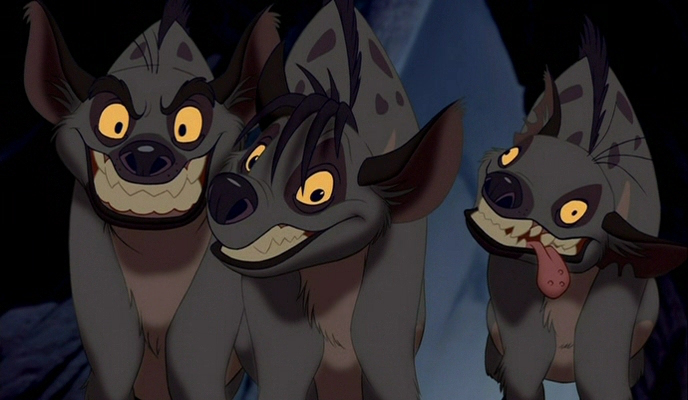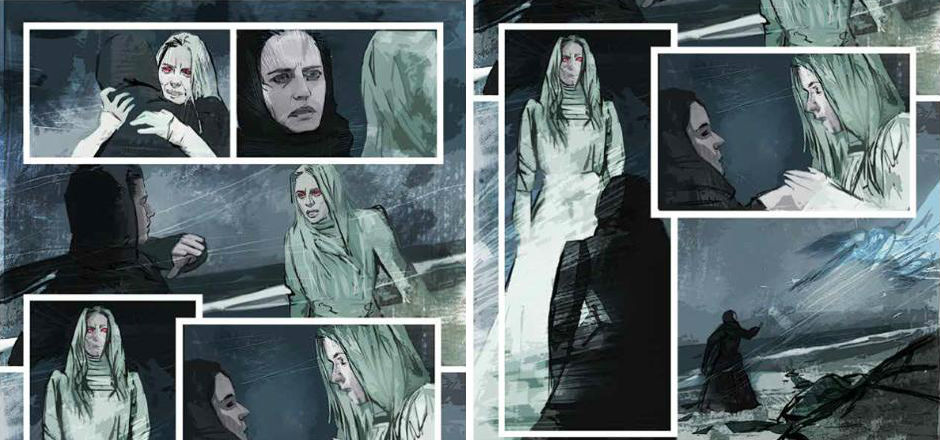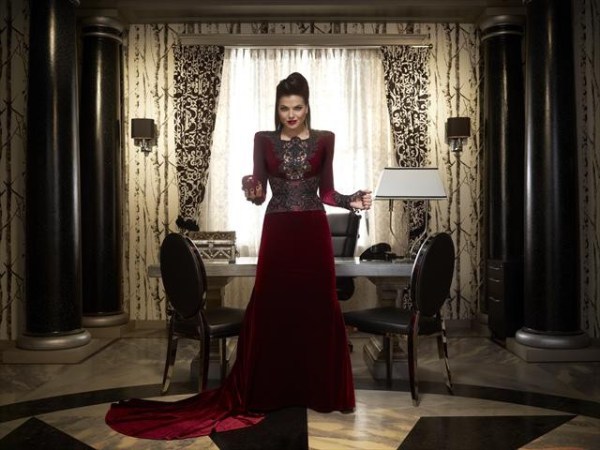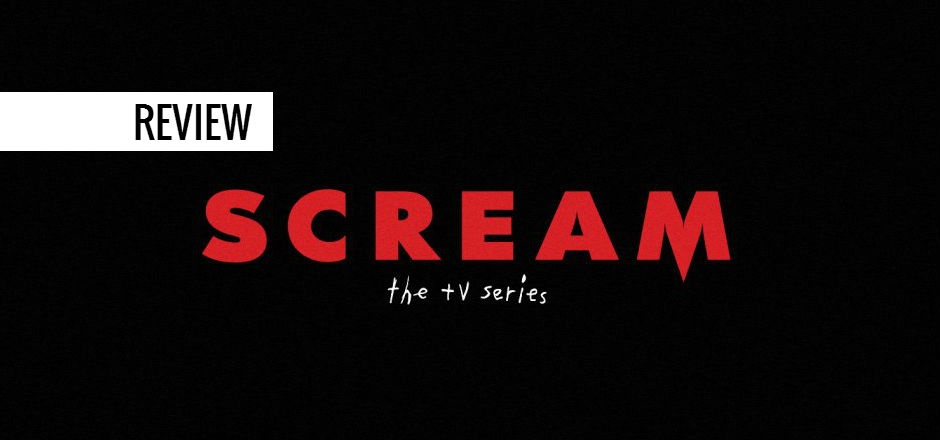Like many a 90’s child, The Lion King was one of my very favorite movies growing up. Timon and Pumbaa were funny, I couldn’t resist crying a little when Mufasa died, and it was tons of fun bouncing around on my couch with my little sister while singing “I Just Can’t Wait to Be King” in obnoxious little-kid voices.
But there was something that always bothered me a little about The Lion King that I never quite understood until I got older: people hated the hyenas. Sure, they weren’t exactly nice to Simba – actually, they were terrifying – but I always felt bad for them, and I never exactly knew why.

It wasn’t until I read this article from Cracked.com when I realized exactly what it was about Shenzi, Banzai, and Ed that gave me the shivers as a child. In the movie, it’s made clear that the hyenas are “slobbery, mangy, stupid poachers” and eventually help Scar take over the Pridelands. How awful, amirite? Why would they ever do something to help the bad guy?
Except that, as the writer points out,
They want something to eat. That’s their problem, and it’s only a problem because Mufasa banished them from the Pride Land and forced them to live in an elephant graveyard, which is no place to raise a child, hyena or otherwise.
That got the gears working. Then I thought about something I’d discussed with a friend a few years ago, a friend who was utterly convinced The Lion King was racist. Her reasoning? Apart from the fact that Shenzi is voiced by (black) Whoopi Goldberg and Banzai is voiced by (Mexican) Cheech Marin, my friend was upset by the overall depiction of the hyenas – dirty, uneducated, living in the Pridelands equivalent of the ghetto, and stereotypically criminal. It was easy to see how she could reach such a conclusion.
However, the article and my friend’s conclusion started coming together when I recalled a lecture I attended in high school about depictions of race in Disney’s Dumbo. While the general buzz about Dumbo is that it’s clearly racist, the presenter, a professor of English at the nearby university, interpreted the movie’s imagery as well as other events at the time it was made to determine that the film is actually about a mixed-race child, with Dumbo’s Indian elephant mother representing a white woman and his African elephant father – where he got his large ears – representing a black man, resulting in the film chronicling the plight and exploitation of a mixed-race child.
Not all stereotypical depictions of race are a display of the creators’ racism. Sometimes stereotypical depictions of race serve to help the creators call out the racism of others.

So let us begin again and start looking at the hyenas through this lens.
First, there’s the problem of hyena “villainy” in The Lion King. The very first time we see the hyenas, they’re trying to eat Simba and Nala – evil and sinister, right? Except we’ve established that the hyenas are starving and motivated primarily by food. That is exactly how Scar manages to make them his minions: he provides them food – he gives them ONE SINGLE ZEBRA LEG before the “Be Prepared” sequence – despite his obvious disdain for their intelligence and overall quality of life. In fact, look at what the hyenas are excited about when Scar talks about killing Mufasa and Simba, and especially after he tells them “Stick with me, and you’ll never go hungry again”:
In case you missed it, let me point out just what the hyenas are saying in the background during the eerie marching scene:
Ooh – ooh la la la!
We’ll have food!
Lots of food!
We repeat
Endless meat
If we continue envisioning the hyenas as a commentary on race, it’s clear that the hyenas’ role in “Be Prepared” is an example of just what motivates poor minorities to reject authority figures and, to some extent, become involved in criminal activity.
The hyenas are forced to live in a deteriorating environment by a ruling class that repeatedly describes them as having overall lower intelligence and worth. They only join Scar because he promises to meet their basic needs – specifically food, which can stand in for any basic need such as shelter, protection, or anything else – even though Shenzi’s expression after Scar grabs her face and her in “Be Prepared” makes it obvious she dislikes how Scar treats them. They even turn on Scar after hearing him tell Simba they’re the lions’ enemies, disproving his apparent idea they’re too stupid to understand when someone’s insulting them.
The parallels between the hyenas and groups living in poverty create a striking image of the disparity between the rich and poor in society, especially when examining the qualities and characteristics of each named hyena as portrayed by its actor: Shenzi seems to be a young black woman, Banzai can be interpreted as a Latino immigrant, and Ed likely depicts a mentally ill or mentally disabled individual.
While anyone could read the surface ripples to decide minorities are depicted as inherently evil or sinister, I truly believe in a deeper interpretation: these “children’s stories” show us that while we as a society continue to marginalize minority groups and ignore their essential needs, we can only expect them to turn to the first person who will provide them with the basic needs – food, shelter, even friendship and acceptance – regardless of the consequences.
Feliza Casano is the founder and editor in chief of Girls in Capes and writes for all sections of the web magazine. She, too, is often motivated by food.
 Interested in more things Lion King? Find fascinating collectibles, hard-to-find books, and more at The Collectionary in their Lion King club.
Interested in more things Lion King? Find fascinating collectibles, hard-to-find books, and more at The Collectionary in their Lion King club.







Reblogged this on Big Blue Dot Y'all and commented:
Think on this. Ask the hard questions.
Amazing when you look at it this way how easily we can be drawn into fighting ourselves and brainwashed into supporting those who exploit us.
I would like to point out that the strongest defense against this kind of manipulation (like what Hitler did, clearly referenced in this sequence) is a realization of our spiritual Oneness. No one can be demonized if we don’t believe in demons. As Neale Donald Walsch said, speaking as God, “I have sent you only angels.”
Having said that, let us do our best not to demonize the exploiters, also, and I need to follow this advice myself. They, I believe, are simply misled.
I think that’s a great point – if you’ve ever seen The Lion King 2, which was a direct-to-video sequel, they actually address that directly in the song “We Are One,” and the idea that all lions are “one” is a major theme.
I just watched the film for the first time, and even though I didn’t dislike it, I coun’t help but having the same thoughts as your friend. Your text was great as an expanded view of the subject, but while misinterpreted [the film], it can either be seen as pro-segregationist or as criticism of the elitism. For good or for bad, most of people simply see it as a children’s film, as most of them seems to freak out when one mentions this subject.
Oh, I can certainly see how people feel that way about TLK. On the surface, without any closer examination, the hyenas are total caricatures. But I always had more – I guess you could say empathy for the hyenas. I liked them a lot, and I always thought they were charming underdog types.
The movie’s interpretation definitely hinges on whether or not the viewer has any positive feelings towards the hyenas – I think if a viewer doesn’t like the hyenas at all, the connotation is a lot more negative than if the viewer thinks the hyenas are being treated poorly by the ruling lion class.
Personally, It’s far more likely that when this movie was made, the writers didn’t even think about this racism thing. They chose the hyenas because hyenas are the ancestral enemies of lions, they aren’t doing their best to make poor people look like scum, they wanted funny bad guys. So this article is probably overthinking it. But I’m not a God, I don’t know everything, so maybe they did make this movie with racism in mind. Idk. Even so, this article was well written, so good job. One last thing, ED IS NOT MENTALLY CHALLENGED, HE IS JUST GOOFY!